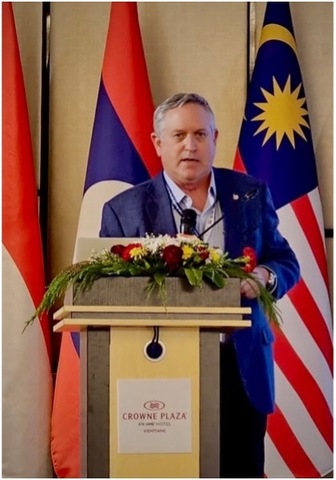By Christopher Rich, Executive Director, U.S. Water Partnership
This fall, the pioneering Water Smart Engagements (WiSE) platform marked five years of global cooperation on urban water security by pairing water utilities in Southeast Asia with U.S. counterparts to exchange insights and innovations that help strengthen sector governance, financing, institutions, and markets.
Funded by the U.S. Department of State’s Bureau of Oceans and International Environmental and Scientific Affairs (OES) and managed by the U.S. Water Partnership, a Global Ties U.S. partner organization improving global water security by mobilizing U.S. expertise, WiSE is implemented in collaboration with the Water Environment Federation (WEF), Global Ties U.S., and local community-based members of the Global Ties Network.

The author discusses the impact of WiSE at a 5-year celebratory event.
Through the U.S.-ASEAN Smart Cities Network, five urban water utilities in Southeast Asia were paired with five leading U.S. water utilities to share best practices and catalyze solutions, including non-revenue water reduction, improved operational efficiency, utilization of nature-based solutions, and strengthened disaster response preparedness for urban water systems supplying more than 21 million people. The WISE platform delivers on the U.S. Government’s Global Water Strategy (2022-2027) by providing expertise and support to international service providers and regulators, and supports the UN Sustainable Development Goal 6 (UN SDG 6) to ensure access to water and sanitation for all.
As I reflected at the U.S.-ASEAN partnership’s celebration event in Washington, DC last week, I noted that our peer-to-peer model has proved to be a successful blueprint for metropolitan water utilities worldwide to advance water management systems.
We know that water utilities everywhere face the converging impacts of population growth, aging infrastructure, watershed depletion, and wastewater treatment capacity. Peer collaboration can scale technologies that conserve energy, recover and reuse water, and minimize water waste while building operator capabilities to adopt measures that increase resilience.
The WiSE U.S. – ASEAN water utility pairings comprised:
- Provincial Waterworks Authority (Phuket, Thailand) with the Water Council (Milwaukee, Wisconsin)
- Saigon Water Corporation (Ho Chi Minh City, Vietnam) with the San Francisco Public Utilities Commission (San Francisco, California)
- Permodalan Darul Ta’zim (Johor Bahru, Malaysia) with DC Water (Washington, District of Columbia)
- Vientiane City Office for Management and Services (Vientiane, Laos) with Clean Water Services (Hillsboro, Oregon)
- Metro Cebu Water District (Cebu, Philippines) with the Miami-Dade Water and Sewer Department (Miami, Florida)
These relationships were strengthened through a series of in-person and virtual engagements, culminating most recently at an event at Singapore International Water Week in June 2024, a leading global forum to share and co-create innovative water solutions. Additional follow-on meetings and site visits have taken place in partner cities across Southeast Asia and the United States for participants to collaborate and identify next steps towards increased water security.
Shared challenges require shared solutions
A key outcome of the U.S.-ASEAN bilateral water utility partnerships are these long-term relationships forged and the commitments to exchange best practices to improve wastewater discharges and increase efficiencies in operations. Continued cooperation will further catalyze water finance, service delivery, cyber security, and policy solutions.
As my colleague Julien Katchinoff, Water Team Lead at the U.S. Department of State, observes: “The U.S. Water Partnership’s Water Smart Engagements (WiSE) program is evidence of how crucial it is to build long-term, multi-country relationships that exchange knowledge to address the shared complexities of building more resilient cities and communities around the world. The Department of State is pleased to have supported this initiative for five years, which demonstrates our commitment to implementing the U.S. Global Water Strategy.”
Our partner Katherine A. Brown, Ph.D., President and CEO of Global Ties U.S. recently remarked: “The WiSE program provides a unique opportunity for members of the nationwide Global Ties Network to help strengthen global water security by facilitating opportunities that connect water leaders – from government and the private sector – with their ASEAN counterparts to exchange best practices and new ideas.”
Other important outcomes of the platform included the translation of a technical manual for water operators into Thai, a Memorandum of Understanding between PDT and DC Water, and a Memorandum of Understanding between SAWACO and the Singapore Public Utility Board. Pairings have also worked to develop concrete action plans for technical assistance and training.
As we complete this phase of the WiSE international water utility partnership journey, we thank Global Ties U.S. for being a vital implementing partner. We would have been hard pressed to conduct such a complex series of simultaneous visits across seven countries, manage interpreters and itineraries, and establish such a successful WiSE platform without the continuous and steadfast, expert support of Global Ties U.S.
As we enter its sixth year, I am proud to reflect on all WiSE has accomplished. WiSE has promoted sustainable water management for 10 cities – advancing the global effort to achieve universal and equitable access to safe and effectively managed water and sanitation services without increasing greenhouse gas emissions. The peer-to-peer model has proven to help strengthen water quality systems, and our success in Southeast Asia has created demand for expansion in Latin America and other water insecure regions.
